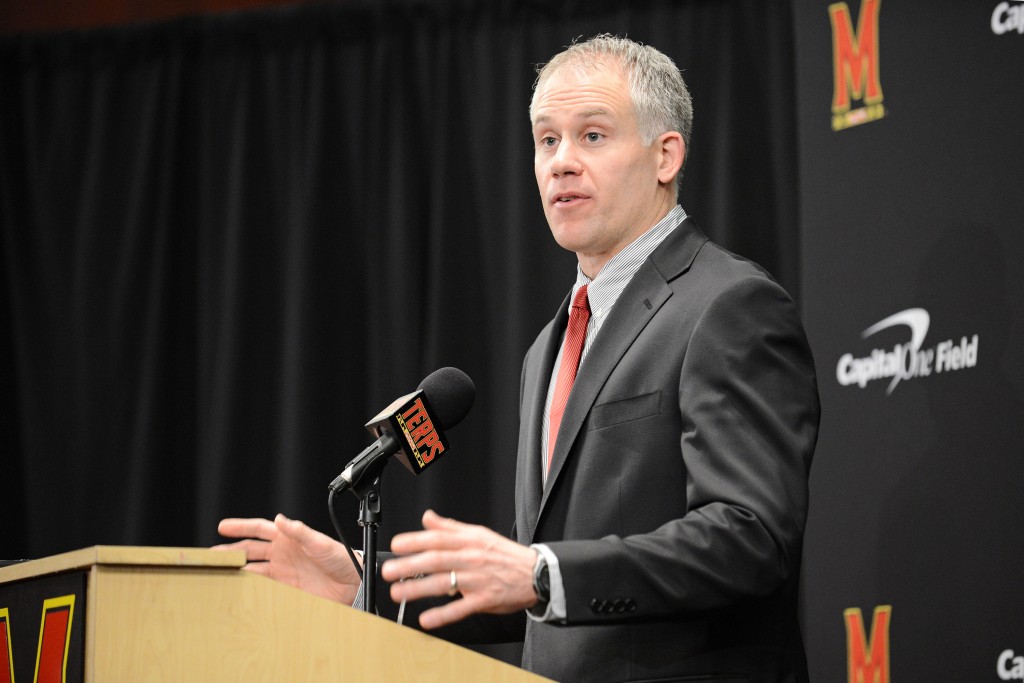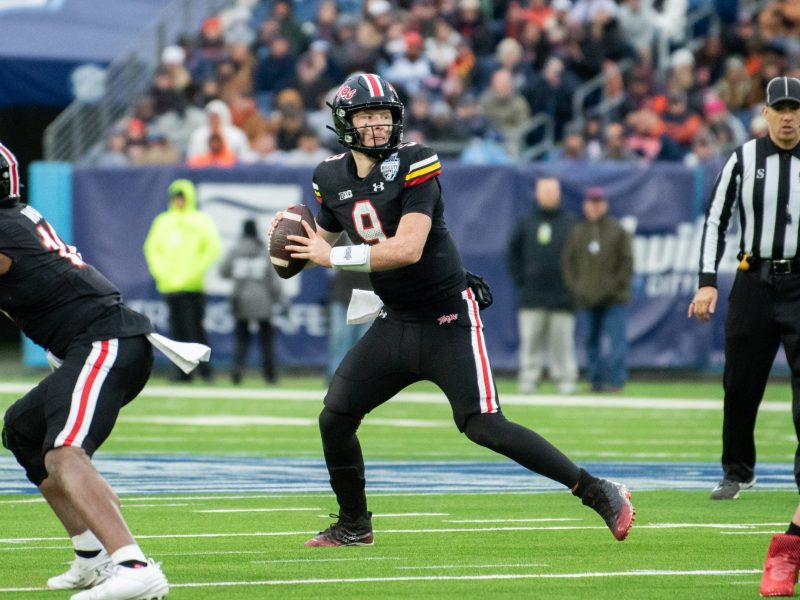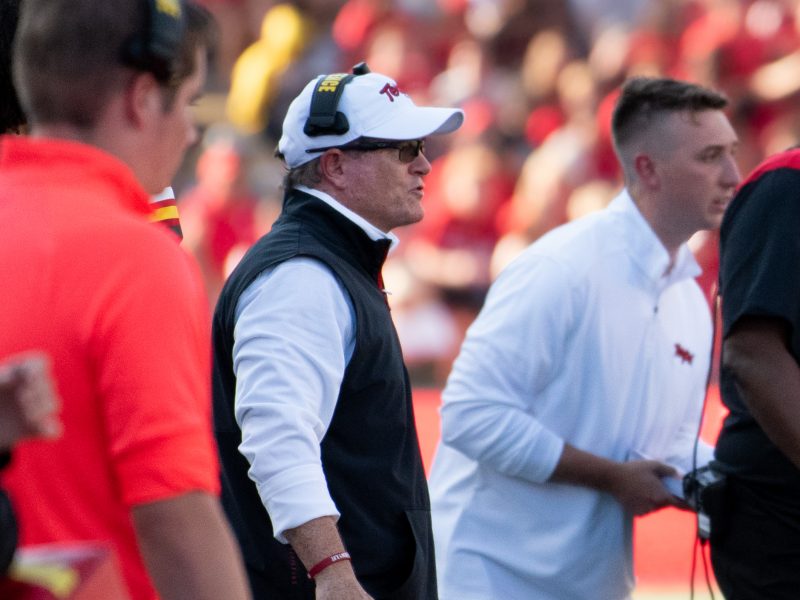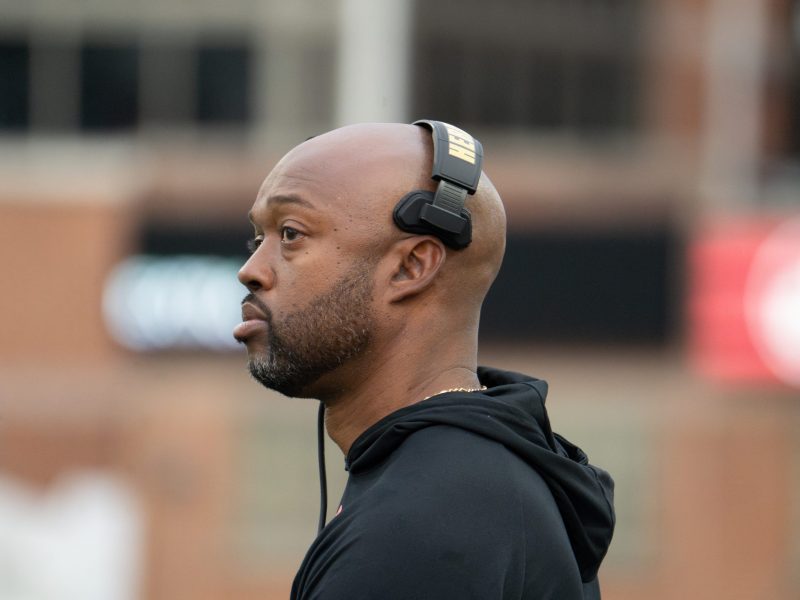Soon after DJ Durkin was named Maryland football’s head coach in 2015, he organized a fundraising dinner for about 40 donors.
After eating dinner on the field at Maryland Stadium, he brought the donors into the locker room and gave a pitch for them to join his newly minted Champions Club.
As Durkin spoke, Michele Jaklitsch turned to her husband, Rick, a personal injury lawyer in Prince George’s County.
“Oh my god, he sounds exactly like Gary Williams,” she said. “I want to go play for this man right now.”
About half of the donors Durkin pitched on his vision for the program immediately joined the club, committing to donate at least $25,000 per year for five years. Three years later, as Durkin’s future with Maryland remains uncertain, those original members are standing by a coach — and a program — they feel has been unfairly attacked by the media and the university itself.
“He’s the right guy,” said John LaPides, the CEO and founder of an Annapolis-based investment firm and Champions Club member. “He represents the university well and brings the right kind of culture.”
As soon as he took over, Durkin strove to make changes to a middling program attempting to make the jump to Big Ten football standards. He hired Rick Court, a fiery strength and conditioning coach, to be his right-hand man and instill a winning culture. He gave the team impassioned motivational speeches, and ran competitive practices and grueling workouts, which have been under scrutiny following the death of offensive lineman Jordan McNair.
[Read more: “A deep loss”: Following the death of Maryland football’s Jordan McNair]
To get the team on board, Durkin told them that if they performed well on and off the field, they could become a part of the players’ version of the Champions Club. As then-Terps quarterback Perry Hills said in 2016, the club rewarded players who did “everything right,” serving as a greater incentive than anything the program had in the past.
“If you’re not in Champions Club, [Durkin] has a hard time trusting you,” Hills said, “because you’re not doing the right things.”
As several players and parents soured on Durkin — and reports from ESPN and The Washington Post painted a picture of a toxic team culture — the boosters in the Champions Club remain ardent supporters, even as Durkin nears a second month on administrative leave as a Board of Regents-led commission investigates the program.
A separate investigation found Maryland trainers made fundamental mistakes that led to McNair’s death. The donors don’t feel that should be held against Durkin, who was at the workout where McNair suffered heatstroke; they echo the university’s public stance that the training staff and coaching staff are separate entities.
“The coach continues coaching and the training staff takes care of any player that can’t complete drills,” Rick Jaklitsch said. “It’s so ridiculous that [Durkin is on leave].”
And even following a lengthy report from the Post on Sunday that highlighted experiences of former players and parents and alleged physical and psychological abuse from Durkin and other staff members, members of the Champions Club remain firm, based on their first-hand experiences around Durkin and the team.
“I have faith that the committee will thoroughly investigate all these claims and issue a comprehensive report soon,” Harry Geller, an “entrepreneur in residence” at this university’s business school and Champions Club member, wrote in a text message Sunday afternoon. “From my experience as a booster and educator close to the program, there is no toxic culture as reported and coach Durkin deserves to be reinstated as soon as possible.”
Champions Club members cast doubts over the use of anonymous players as sources in the ESPN and Post reports, though multiple players allowed their names to be published in both of them.
So while the investigation into the team’s toxic culture is ongoing and reports like Sunday’s paint an ugly picture, most members of the Champions Club think they know what the outcome will be: Jaklitsch confidently proclaimed that “there’s no toxic culture there,” and he feels “it’s ridiculous that [Durkin’s] not the coach right now.”
That sentiment spurred the group, along with other donors, to send a letter dated Aug. 27 to the Board of Regents in support of Durkin, after the board assumed control of the investigations.
Rich Novak, a Champions Club member who played quarterback for the Terps from 1959 to 1961, said the allegations of a toxic culture are “preposterous,” and seeing the reports “made my guts sick.”
“I’m sure [Maryland’s conditioning is] the same as is Ohio State or Michigan or Alabama or USC, you name them. If you’re competing in big-time athletics, you need to have good conditioning and so forth,” he said. “But toxic? And where you berate players and so forth? I’ve never seen that.”

Coach DJ Durkin discusses a game plan with players during a timeout in Maryland football’s 38-14 loss to Penn State on Oct. 8, 2016 at Beaver Stadium. (Marquise McKine/The Diamondback)
‘DJ cares’
Martin McNair, Jordan’s father, said on Good Morning America in August that Durkin “shouldn’t be able to work with anybody else’s kid.” McNair’s family hired the Baltimore law firm Murphy, Falcon and Murphy, and last month the firm filed “notice of claim” forms, which allow them to seek legal action against the state but do not guarantee a lawsuit is forthcoming.
Champions Club member Bob Pinkner, the CEO of a Baltimore-based beverage distribution company, felt that was disingenuous. Pinkner pointed to the fact that Durkin spoke at McNair’s funeral in June, which he said Martin asked the coach to do.
“If he hated him that much and wouldn’t trust his kid with him and all that, why would he ask him to give a eulogy?” Pinkner said. “All this hatred bit came up later, was all orchestrated by [the family’s attorney] Billy Murphy.”
Murphy, the senior attorney for Murphy, Falcon & Murphy, did not respond to a request for comment for this story.
The investigation into the program’s culture is expected to conclude by early October, although it doesn’t have an official end date. Harvey Sanders, a 1972 alumnus and member of the University of Maryland College Park Foundation’s board of trustees and Champions Club member, said that if the investigation proves the program had a toxic culture, Durkin should be relieved of his duties, though Sanders maintains he doesn’t believe such a culture exists. Other Champions Club members echoed that sentiment.
But from what those members have seen and heard, they find the allegations hard to believe. Even after a lengthy stint on leave that has stretched well into the Terps’ season, Jaklitsch believes Durkin can still be “welcomed back by the fans, by the players, by the donors with open arms.”
“Could [Durkin] have stopped what took place that day with McNair? And if the answer’s no, then I have no problem with him coming back,” Sanders said. “If the answer was yes, obviously it’s a different situation. But if you’re just saying the head coach was responsible, well, who’s responsible for the athletic department, and who’s responsible for the school?”
One player interviewed by Dr. Rod Walters said head trainer Wes Robinson yelled across the field to “get [McNair] the fuck up,” and another player reported Robinson yelling to “drag his ass across the field,” corroborating the original ESPN report from August.
Another player interviewed said McNair didn’t look ready for the training session, and according to Walters’ report, McNair gained 16 pounds between April 9 and his final workout May 29. McNair also told trainers he hadn’t eaten since having a bowl of cereal the morning of the conditioning test, and his gallon of water provided by the team was later found unopened in his locker.
Walters said McNair’s heatstroke was “atypical” but pointed to several significant mistakes made by trainers, such as failing to take his vital signs and waiting for more than an hour before calling 911 after he first was symptomatic.
“As much as we hate to say this, Jordan didn’t do what Jordan was supposed to do,” Jaklitsch said. “A trainer like Wes Robinson thinks a kid’s properly hydrated and runs a drill set up for kids that are properly hydrated, and when the kid didn’t drink the gallon he knew he had to drink, that’s going to send the wrong signal to the person running the drill.”
A Post report published Sunday included numerous interviews with former players and parents recalling abusive treatment that in some cases triggered depression. Though no Champions Club member disputed any of the specific examples of abuse in media reports, they still take issue with the stories as a whole.
“It is interesting to note that every negative player quoted in this [Post] article never played or very little. And that the few quoted that did or do get on the field feel good about DJ,” Pinkner wrote in a text Sunday afternoon. “Otherwise I think this article is BS and will sell papers.”
Of the five players identified by the Post as having a negative experience with the program, two did not play before transferring from Maryland and two more combined for eight appearances in 2017. Wide receiver Deandre Lane, whose criticisms to the Post were mostly directed at the training staff, played in 26 games during his four-year career.
“DJ cares about his players as much as he cares about his own kids,” Jaklitsch wrote in an email Sunday night in response to the Post story. “I agree with the assessment that he pushed people to make them better—that’s why we hired him.”
While there are plenty of concerning stories published publicly, Jaklitsch said that from conversations he’s had with numerous members of the commission — many of whom are alumni or are otherwise closely connected to the university — he’s gathered that the task force is “truly impressed with how much Durkin cares about his players.”

From left: Athletic director Kevin Anderson, university President Wallace Loh and football coach DJ Durkin pose during Durkin’s introductory press conference in Glazer Auditorium on Dec. 3, 2015. (File Photo/The Diamondback)
‘Dr. Loh has to go’
Durkin rests at the center of Maryland football’s storm, but University President Wallace Loh and athletic director Damon Evans are far from being in the clear. And some members of the Champions Club believe the most logical move would be removing Loh from his post, not Durkin.
Members of the Champions Club disagree with Loh’s reaction to the ESPN reports, which included placing Durkin on leave. Loh and Evans have not faced any public repercussions stemming from McNair’s death.
“I’ve never felt [Loh] really has the pulse of the school,” Pinkner said. “I’ve just never had a warm feeling for him. I’ve never thought he was that involved in athletics. … Maybe it’s because of my friends — everybody has the same feeling, that Dr. Loh has to go.”
Most members of the Champions Club are fine with the Board of Regents assuming control of both investigations and feel the task force investigating the program’s culture will do its due diligence.
But the crux of the Champions Club’s complaints — the reason for their letter to the Board of Regents — was Maryland’s response to ESPN’s allegations in August. For a group allotted more access than most into the inner workings of a Big Ten football team, Champions Club members say they haven’t seen evidence to back up ESPN’s coverage, which included multiple reporters but was spearheaded by reporter Heather Dinich, who has drawn the ire of some Maryland fans and boosters.
“To take advantage of that tragedy and blow this whole thing up … was, pardon my French, bullshit,” Pinkner said. “She took advantage of a tragedy and made it this big, big yellow journalism article.”
“It’s a spectacular failure of leadership that Dr. Loh didn’t go and attack that misnomer of the football program,” Jaklitsch said. “Instead of believing DJ Durkin and all the players in that program, [he] believed Heather Dinich — which is ridiculous and absurd. And for that, Dr. Loh should lose his job.”
Champions Club members did not point to any specific example of ESPN’s reporting as being false. When asked for comment, ESPN spokesperson David Scott provided a five-word statement: “We stand by our reporting.”
Not all club members want Loh to lose his job. Novak doesn’t find fault in either Evans or Loh’s handling of the fallout; he feels the president is usually methodical in his decision-making.
Geller said he goes to practices when he wants to and has eaten numerous meals with the team. He said his experience talking to players shows how much they like the program and Durkin.
“If it’s a toxic culture, you can sniff it out pretty quickly,” Geller said. “It just didn’t seem to be that way whatsoever.”
The Champions Club feels they were close enough to the program that they would’ve known if Durkin, Court or the trainers were mistreating players. So, viewing themselves as having first-hand, insider knowledge of the program run by a man to whom they pledged at least $125,000, they dismiss the mounting evidence against him.
“From what I’ve heard — they haven’t finished their investigation, they have another week,” Jaklitsch said, “but they haven’t seen any evidence anywhere of any toxic culture at all.”



